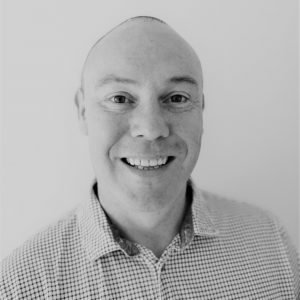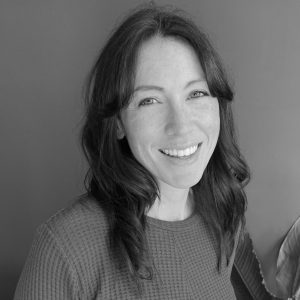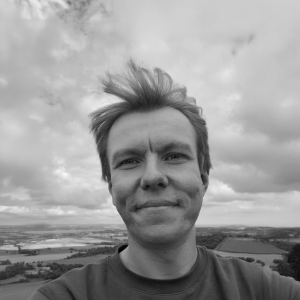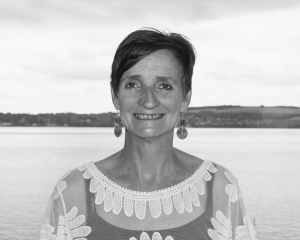No Wrong Path: Children in Scotland staff share advice on SQA results day
5 Aug 2025
Today, Tuesday 5 August, young people up and down the country will be feeling a mixture of excitement and nerves as they receive their exam results.
Whether planning to head off to university or enter the world of work, finding out what grades they have achieved can be an overwhelming moment for many young people, and so to put minds at ease and celebrate every win, Children in Scotland staff have opened up about their own career journeys. Here, discover their advice and learn why there’s No Wrong Path.
Billy Anderson, Head of Services

After leaving school at 15 with five O Levels, Billy started a two-year YTS (Youth Training Scheme) to become an Agricultural Engineer, following that career for another six years before working as a welder making agricultural feeding equipment. After later working in car body shop, he decided to enrol on a social care course at college while taking on two mentoring roles for teenagers via the Youth Justice and Integrated Substance Service.
After completing his college course, he signed up to study for a degree in Health and Social Studies, later working for the NHS and the Aberlour Child Care Trust. Having retrained and changed careers, he says there’s lots of different ways to pursue your passions.
“After I finished my degree, I worked for NHS in community health development for a year or so, and then focused on children and young people with a role at the Aberlour Child Care Trust,” he explained. “Eights years later, I went to Australia and volunteered with a few children's charities. When I came back to UK, I started working at Donaldson's Grant Aided Special School, and after four years, took on an associate role with Children in Scotland.
“I eventually left Donaldsons to work part-time for Children in Scotland as a Senior Officer coordinating My Rights, My Say, and at the same time took on the role of Development manager at Circle. I was also a mentor for Autistic adults during COVID for Scottish Autism's Affinity initiative, and two years ago I applied for my current role of Head of Services at Children in Scotland.
“For young people getting their results, it’s important to remember that no matter what the grades, you have time on your side to experience things and work out what really interests you. I never had a clue and started university as a mature student – I don't think I could have gone from school straight to uni as I wouldn't have been ready. To some degree I still don't know what I want to do, but I know where my passion and skills lie, and that is in supporting and helping people to be all that they can. But I really did love painting cars, too!”
Julie Thomson, Communications & Marketing Manager

Julie studied Ancient History and Archaeology and French at university, and started working in communications after graduation. She later became a fundraiser and spent several years working at a big hospital in Dublin, however, after the recission hit, decided to move to Edinburgh to study marketing.
She said: “After my degree, I went on about 100 interviews and didn’t get anywhere, so I ended up pulling pints for much longer than I had hoped. That felt like a really low point in my life, and I didn’t attend my 10-year school reunion because I felt rubbish and didn’t want to tell anyone what I was doing.
“However, I happened to meet someone with a digital startup, and although I didn’t know anything about this area, she gave me a shot. I kept shaking the cocktails while also getting to know all things digital marketing.
“I finally got back into charities, and I have been doing comms and marketing ever since. I love the idea that there’s #NoWrongPath and I wish I could have heard it a bit more in my 20s!”
Angus Doyle, Designer

Angus completed a degree in Scottish history at the University of Edinburgh and was set on a life in academia. Things change however and, after developing his passion for graphic design into a career, he’s been Children in Scotland’s designated pixel-pusher for six years.
“I was good at school. From an early age, most subjects came easy to me, and I’ve been fortunate in that so many things fascinate me. I knew from the age of about four that I was going to go to university. It was drummed into me by my Mum that that’s ‘just what you did’ after school.
“I had a great time and thoroughly enjoyed my studies, had some great social experiences, and made some of my closest friends, who remain a big part of my life in my mid-30s. I moved up from Manchester to Scotland and I’m still here! I got a good degree and was all set to do a masters in Canada with thoughts that I’d probably go onto a PhD and a life in academia. But, in the year after my undergraduate degree I began to reflect that I wasn’t sure that all of that was I really wanted.
“I had ended up in history after discovering that one of my GCSE choices – graphic design – was oversubscribed. Initially disappointed, I soon found that I’d landed with the best and most influential teacher of my life (shout out to Mrs Leckie!) – and soon enough, a GCSE became an AS-Level, an AS-Level became an A-Level, leading on to my four years at Edinburgh.
“But I’m not a historian and, in a roundabout way, I’ve come full circle as I now happily make a living as a graphic designer. In the background, design had remained a serious hobby of mine – something I did for the sheer creative pleasure of it, fitting passion projects around my studies. This evolved into creating logos and posters for friends’ events during my uni years. As my portfolio developed, I started to pick up commissions and, as that snowballed, it eventually developed into a full-time career.
“For a long time, I worried about whether I was doing the right thing. Was I wasting my degree and all my studies to develop a career I’d had no formal training in? The answer, of course, is NO! I don’t regret the time spent exercising that academic muscle. It was endlessly fascinating, and I remain passionate about history and the humanities. Following that interest was an end in and of itself, even if I ‘didn’t do anything with it’. Equally, I didn’t need a degree and could just as easily have ended up where I am without it.
“I’ve been very lucky in that I’ve been able to pursue two genuine passions, and that one of them led to a career in the end. It was quite a long road and the main thing I’ve learned is that things change. You change! Life is full of second (and third and fourth) chances, and what feels like the most important thing at 16, 17 or 18, might not a few years down the line. Things aren’t set in stone so be patient and never rush becoming you.”
Judith Turbyne, Chief Executive

From working front of house at the Assembly Rooms during the Fringe to becoming a life model while completing her PhD, Judith has done a lot of what she calls “fun jobs” – and not so fun ones, too. Starting her time at university focused on chemistry, she later transitioned to study psychology, which led to a voluntary role with an organisation in Guatemala.
She explained: “After my role in Guatemala, I went back to studying economics, politics and sociology in International Development, and I also did a PhD on empowerment in development. Over that time, I worked in Central America and the Caribbean with a couple of organisations, as well as in London and Dublin, but family eventually drew me home and I worked with the Scottish Charity Regulator before I was given the great privilege of taking up my role at Children in Scotland.
“It’s so important to do something that will ultimately bring you some joy. Looking back on my career, it looks like I had some planned-out career path, but I have tended to follow my interest and passion. There is absolutely no pressure to find out what you want to do when you are just coming out of school. You may be lucky and the first thing you do will be the thing you want to do forever. But for many people, it is a journey – and it can be a convoluted one. Work might not always be fun, but trying to find the fun, the passion, and something that keeps you enthusiastic, is worth so much more than the money.
“The truth is, I still don’t know what I want to be when I grow up. And that is also okay.”

Read more like this
Check out our blog for more commentary, membership news and more!
Click here to readEnquire
Find out more about Enquire, the national advice and information service for additional support for learning
Visit the websiteReach
The website for young people offers advice and support on accessing their rights
Visit the website